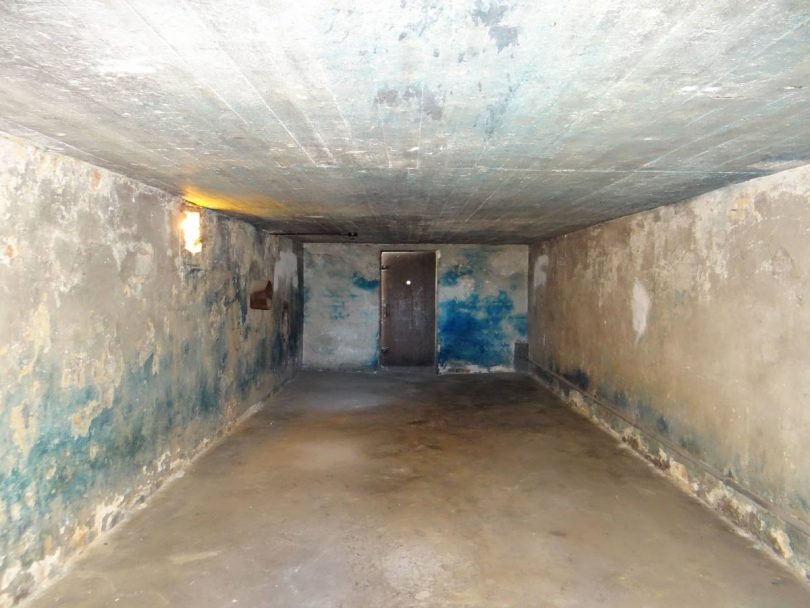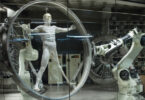Jewish-Zionist Boycott Campaign Shuts Down Prominent Monthly
The Journal of Historical Review, March/April 1995
Under the provocative headline, “The Greatest Taboo of Postwar World History: There were no Nazi ‘Gas Chambers’,” a ten-page revisionist article appeared in the February 1995 issue of Marco Polo, an influential and reputable Japanese magazine.
Packed with advertising for luxury goods by major international firms, and sprinkled with photographs of pretty young women, Marco Polo is a slick, 250,000-circulation monthly aimed at men in their 20s and 30s. Founded in 1991, the current affairs feature magazine is issued by the Bungei Shunju company, one of Japan’s most prestigious publishing firms.
Besides Marco Polo, the company publishes nine weekly and monthly magazines, which are among the most influential in Japan. It is also the Japanese publisher of the Anne Frank Diary, which has sold nearly five million copies in that country.
But this is a “good news, bad news” story. It wasn’t long before the publisher capitulated to an international Jewish-Zionist boycott and pressure campaign, and shut down the magazine for good.
The article, written by 38-year-old neurology physician Dr. Masanori Nishioka, was published only after Marco Polo staff members spent five months checking the author’s sources, conducting additional research, and carefully editing the text.
It appeared with an introductory endorsement by Marco Polo:
On January 27th, the Auschwitz concentration camp celebrates the 50th anniversary of its ‘liberation.’ However, here the greatest taboo of postwar history is hiding. In fact the ‘Holocaust’ — the idea that Jews were slaughtered by the Nazis — has begun to be the subject of serious doubt. There is no doubt that many Jews died tragically. Since the war, it has been shown that none of the concentration camps in the west had gas chambers. Only those in the East are now said to have had them. However, these gas chambers are not sealed properly. From a scientific point of view, the gas used could hardly have been adequate for large-scale killing. In fact, in Europe and the United States questions of this kind have generated considerable journalistic activity. Even a number of Jewish scholars themselves have doubts. Why is it that only Japan’s mass media does not write about this problem? Astonishing history investigated single-handedly by a young physician!
Calling the Holocaust a “fabrication,” Nishioka wrote that “the story of ‘gas chambers’ was used as propaganda for the purposes of psychological warfare,” and is “nothing more than a transformation, without verification, of wartime ‘gas chamber’ stories into ‘history’.” He also wrote:
The “gas chambers” currently open to the public at the remains of the Auschwitz concentration camp in Poland are a postwar fabrication built either by the Polish Communist regime or by the Soviet Union, which controlled the country. Neither at Auschwitz nor anywhere else in the territory controlled by the Germans during the Second World War was there even one “mass extermination of Jews” in “gas chambers.”
Hundreds of thousands of Jews, affirms Nishioka, perished in the camps as a result of disease due to unhygienic conditions, but not as a consequence of an extermination policy. “Neither Hitler nor the Nazi leadership ever planned the ‘extermination’ of the Jews,” he wrote.
Nishioka points out that a chamber at the Dachau concentration camp, which American propagandists portrayed as a “gas chamber” used to kill prisoners, was actually a non-homicidal delousing chamber. He also presents considerable evidence to show that the “gas chamber” shown to tourists at Auschwitz was built by Communists after the war.
In support of his arguments, Nishioka cites a number of historians and various scholarly books and articles. Among them are several published by the IHR, including Dr. Arthur Butz’ classic, The Hoax of the Twentieth Century, and Dr. Wilhelm Stäglich’s Auschwitz: A Judge Looks at the Evidence.
Nishioka also mentions American revisionist writers Mark Weber and Ted O’Keefe.
In addition, last August Nishioka visited Poland to inspect the former concentration camps of Auschwitz (including Birkenau) and Majdanek. Among the photographs accompanying the article are five taken by him during that visit. Two show the “crematory chimney” at the Auschwitz I camp. As these photos make clear, the free-standing chimney is an obvious dummy, not connected to a crematory or even a building.
Comparing the wartime fate of Europe’s Jews with that of Chinese killed by Japanese troops, and the victims of American atomic bombings of Japanese cities, Nishioka concludes his article with an expression of sympathy for the “tragic deaths” of many European Jews.
Initial Resistance
Jewish-Zionist groups responded to the article with characteristic speed and ruthlessness. Through its embassy in Tokyo, the Israeli government formally protested to the Japanese government, while the Simon Wiesenthal Center of Los Angeles mounted a boycott campaign against the Bungei Shunju company.
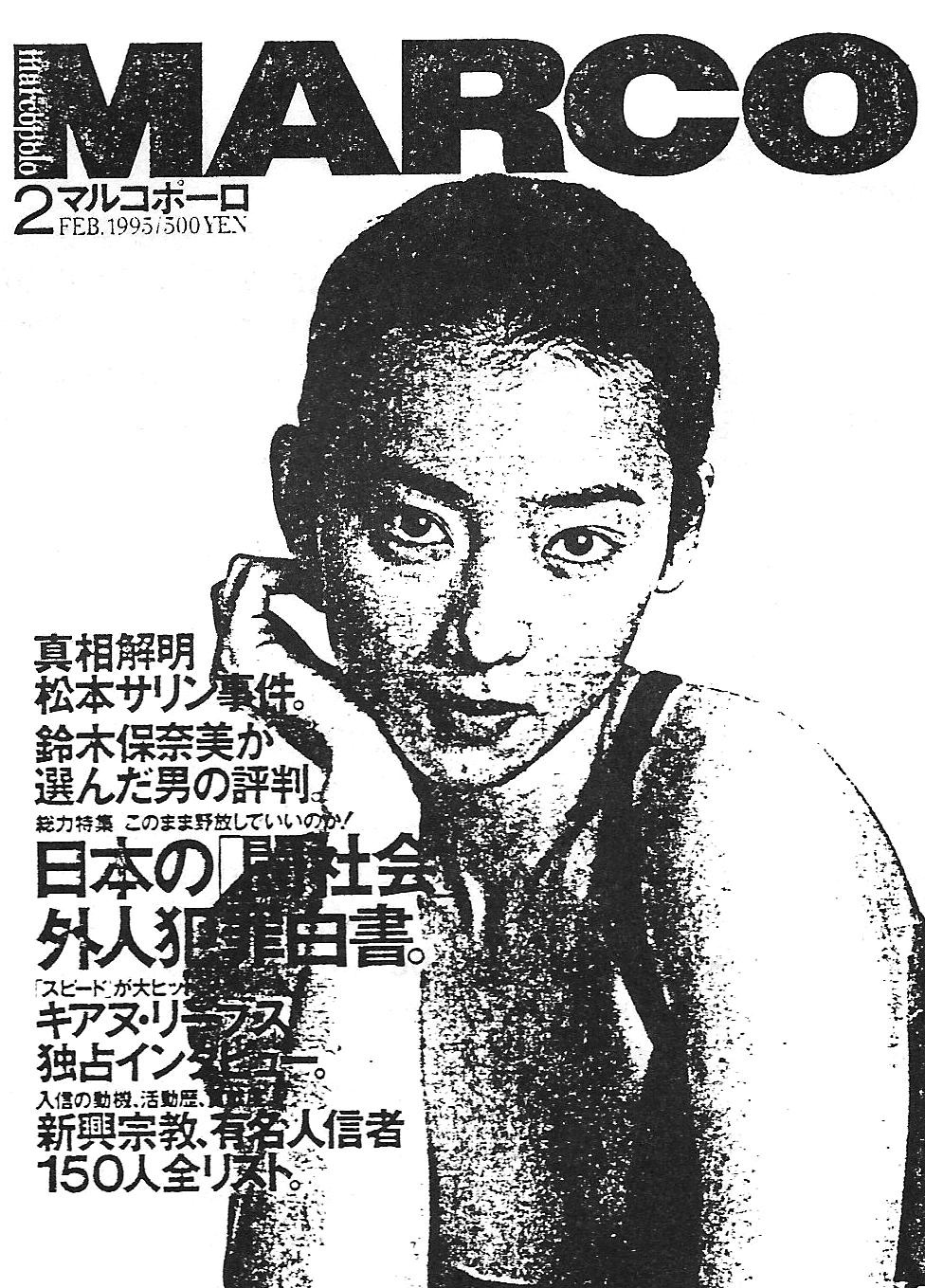
The magazine’s initial response was a statement defending the provocative article. In explaining his decision to publish it, Marco Polo editor Kazuyoshi Hanada — one of Japan’s most prominent journalists — said that Dr. Nishioka had found evidence to show that standard views about gassings of Jews are not accurate. “We would not run an article we thought was wrong,” Hanada said on Jan. 24.
“It’s not good for everything about a certain subject to be taboo,” he added. “Maybe Israelis and Japanese have different ways of thinking about that.” Hanada even asked Nishioka to contribute additional articles to future issues of his magazine.
Hanada become editor of Marco Polo in April 1994, after having served as editor of Shukan Bunshun, another Bungei Shunju magazine. Under his editorship, Shukan Bunshun attained the highest circulation of any weekly magazine in Japan. In recent months, Hanada has appeared on television as a commentator.
Marco Polo also generously announced that it would welcome a rebuttal of Nishioka’s article, offering both the Wiesenthal Center and the Israeli embassy an opportunity to respond with a ten-page article of its own. The offer was promptly and predictably rejected.
Rabbi Abraham Cooper, deputy chief of the Wiesenthal Center, said: “Their [revisionists’] goal is to get debate going. They’re seeking to give legitimacy to their view.” In a Jan. 25 letter, the Israeli embassy wrote to the publisher: “If your magazine is going to take a neutral observer position, that of a courtroom trial, in which both sides’ arguments and claims are to be introduced, we must decline.”
The Wiesenthal Center mounted an international boycott campaign against Marco Polo advertisers, and quickly succeeded in persuading major firms – including Volkswagen, Cartier, Philip Morris, Mitsubishi Motors and Mitsubishi Electric — to cancel their advertising.
Accompanying the economic arm-twisting was a propaganda barrage with the usual smears. The Wiesenthal Center put out the falsehood that Dr. Nishioka never visited the site of any wartime German concentration camp. This lie was widely repeated, such as in a Chicago Tribune report (Jan. 25) from its Tokyo-based staff writer Merrill Goozner.
As a result of the campaign, the Japanese government on Jan. 30 issued a statement calling the Marco Polo article “extremely improper.” A Foreign Ministry official added that Japanese embassies and consulates around the world would be instructed about the government’s “position on the Holocaust.”
Capitulation
Under such pressure, it didn’t take long for the publishing company to capitulate. On Jan. 30 Bungei Shunju issued a statement of apology: “We ran an article that was not fair to the Nazi massacre of Jewish people, and by running the article, we caused deep sorrow and hardship for Jewish society and related people.”
Marco Polo magazine didn’t just surrender. It committed Hara Kiri.
At a packed news conference on Feb. 2 with Wiesenthal Center deputy director Rabbi Abraham Cooper, Bungei company president Kengo Tanaka formally apologized for causing Jews “immeasurable pain” by publishing Nishioka’s article. To atone for its grievous sin, Tanaka said he had closed down the offending magazine for good, and had relieved the responsible staff members of their duties. All remaining copies of the February issue were being recalled and destroyed.
‘Hit By a Steel Bat’
“We came to know of the very deep pain and agony inflicted by the Marco Polo article,” said Tanaka, who acknowledged that the decision to shut down the magazine was made in response to protests from the Israeli government and Jewish organizations.
“I have realized how much anger and sorrow this article has caused within Jewish society. I feel like I’ve been woken up after being hit by a steel bat. I truly regret that we ran the article,” said Tanaka. “As a country that hopes to become more international, Japan must recognize the plight of Jews.”
Rabbi Cooper of the Wiesenthal Center praised Tanaka’s action as “serious and unprecedented,” and announced that the Center was calling off its economic boycott against Bungei.
Tanaka’s craven repentance apparently was not enough, however. On Feb. 14, he resigned as president of Bungei Shunju.
A dissenting voice broke the tranquility of the canned news conference. Journalist, author and revisionist researcher Aiji Kimura loudly harangued Cooper and demanded that the company president explain specifically what was inaccurate about Nishioka’s article. Kimura also defended historical revisionism, speaking of its peaceful, truth-seeking motivation. Hundreds of fellow journalists responded to his remarks with spontaneous applause and expressions of agreement.
Kimura is a leftist journalist who worked for years at the NTV television station in Tokyo. He has written several books, including a highly critical treatment of the US-Japanese role in the Gulf War. Last November Kimura visited the IHR office in southern California, where he conducted a videotape interview with Journal editor Weber.
Controversy Continues
At a news conference on Feb. 1, Dr. Nishioka sharply condemned the unfair suppression of one side of an important debate. “Marco Polo was crushed by Jewish organizations using advertising [pressure], and Bungei obliged,” he said.
Nishioka said he welcomes criticism of his work, but feels “deep anger” over the publisher’s decision to kill the magazine. “The publisher announced that the story lacked fairness without consulting me. I oppose such a move as it imposes control on freedom of speech.”
“Listen,” he said, “I had no intention of defending the Nazis in the article. I was just going to introduce the fact that there are still such arguments and unsolved questions on the Holocaust.”
Operating much as it does in the United States, the “smearbund” has been hard at work in Japan. An opinion piece, “Rewriting History,” by Michael Hoffman in the English-language Mainichi Daily News, Feb. 5, attempted to refute Nishioka’s article. As a key piece of evidence “proving” the Holocaust story, it cited the familiar postwar “confession” of Auschwitz commandant Rudolf Höss. (As revisionists have repeatedly pointed out, and as Holocaust historians quietly acknowledge, this “confession” is packed with major falsehoods, and was obtained by torture.)
Also writing in the Mainichi Daily News, columnist David Benjamin (Feb. 15) smeared Dr. Nishioka as “a notorious pest” and “anti-Semitic crackpot” who writes “drivel” and furthers a “neo-Nazi thesis.”
In an article about the Marco Polo controversy, the Japanese magazine Aera told readers that IHR Journal editor Weber had remarked that “Hitler is a philosophical leader of the 20th century.” This falsehood is based on a mangled paraphrase of a quotation by American writer George Will, who had misrepresented remarks made by Weber during a luncheon meeting. This spurious quote appeared in an August 1993 syndicated column by Will. (For more about this, see the Nov.-Dec. 1993 Journal.)
More thoughtful voices are also being heard in Japan.
A reputable but aggressively leftist monthly magazine, Uwasa No Sinsoh, has been notably sympathetic to the revisionist view. A revisionist article by Aiji Kimura was published in the Sept. 1994 issue, and a short, pro-Nishioka article appeared in the March 1995 issue. Moreover, the editor has permitted readers to debate specific revisionist points in the magazine’s letters section.
A rather sympathetic interview with Nishioka appeared in the March 8 issue of the weekly Japanese magazine Spa.
A professor at Doshisha University, Ken’ichi Asano, wrote about the “Marco Polo problem” in the April 1995 issue of the Japanese monthly magazine Ushio. While avoiding any concrete discussion of revisionist views, Asano criticized Bungei Shunju’s handling of the “problem.”
Another monthly magazine, Tsukuru, ran four articles on the Marco Polo furor, including one by Nishioka based on an interview. In a lengthy article in the April issue, journalist Shoko Egawa criticized the Wiesenthal Center and the Bungei Shunju company for curtailing free speech, even though she does not support Nishioka’s views. “This [Marco Polo] incident will make issues involving Jews completely taboo,” she wrote. “Even if the issue was not Holocaust denial, criticisms of Jews will disappear for a while from the media. There is a great danger that this will create new prejudice or discrimination against Jews.”
Several articles on the Marco Polo incident, most of them quite critical, appeared in the biweekly magazine Sapio. In one, though, prominent journalist Hajime Takano wrote that the incident “revealed the shallow depth of free speech in Japan,” and cautioned: “The media, which should defend freedom of speech, should not make any issue taboo.”
Japan’s most prestigious daily paper, Asahi Shimbun, published a very detailed feature article about the “Marco Polo problem” in its Feb. 23 issue. While generally critical, it accurately quoted comments by Nishioka, Kimura and Prof. Keiichi Tsuneishi of Kanagawa University. Tsuneishi is a respected scholar of Japan’s secret wartime “731 Unit” in China, and an acknowledged expert of chemical warfare. He is regarded as a leftist. While believing that an extermination was carried out by the Nazis, Tsuneishi cast doubt on the claim that Zyklon B was used to kill Jews, as alleged, pointing out that the Nazis had more effective poison gases at their disposal.
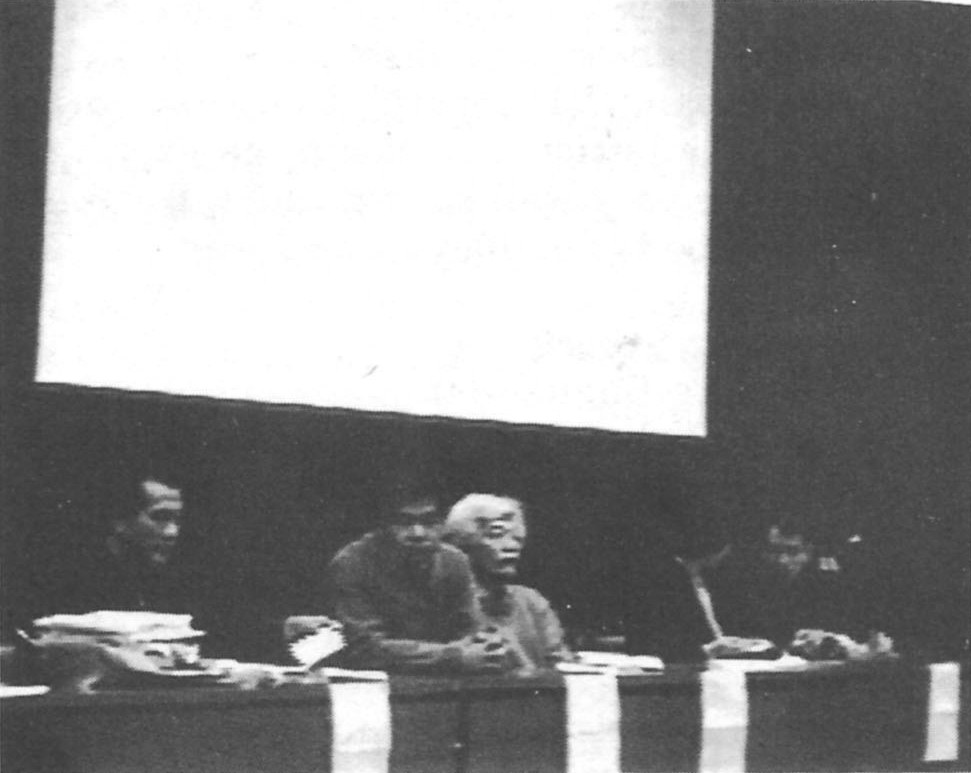
Japanese television coverage of the Marco Polo “problem’ has generally been timid and reserved, especially by NHK and TBS. However, Fuji-TV, which is regarded as rather conservative, broadcast a half-hour report, Feb. 3, during which a German journalist strongly criticized Nishioka’s article, saying that it would not be permitted in Germany because it is equivalent to “encouraging murder.” In the same broadcast, though, a renowned journalist affirmed the right of Nishioka and other revisionists to publicize their views, and a prominent non-fiction writer, Naoki Inose, expressed the view that Japanese periodicals should report on controversial aspects of the Holocaust issue in an open and responsible manner.
Cole in Japan
At the invitation of Japanese revisionists, American Jewish researcher David Cole flew to Japan to explain that the Wiesenthal Center does not speak for most Americans, or even all Jews. (Cole, a young filmmaker who addressed the 1992 and 1994 IHR Conferences, made the video “David Cole Interviews Dr. Franciszek Piper.” See the review in the March-April 1993 Journal.)
Cole spoke at two Tokyo news conferences, Feb. 15 and Feb. 18. About 70 journalists attended each meeting (paying $20 each). At the second news conference, he was joined by Dr. Nishioka and Prof. Tsuneishi.
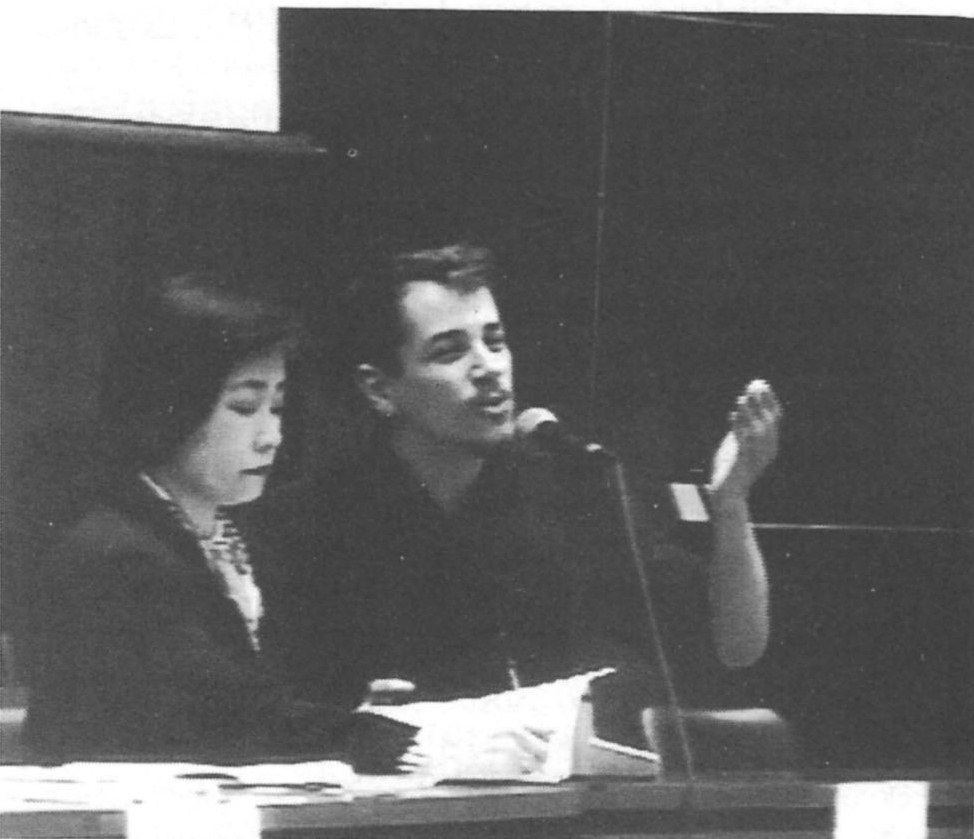
With the exception of two reporters from the Asahi Shimbun (a major rival of Bungei Shunju), the journalists were friendly and receptive. “What a contrast to the mud-slinging and name-calling of journalists in the United States,” Cole later commented.
The conferences were ably organized by the energetic Kimura, who had arranged for interpreters and dubbed television showings of both Cole’s video and the March 1994 “Donahue” show on which Cole had appeared. Each journalist was also provided with information packets that included IHR leaflets and other revisionist materials.
As a result of these news conferences, articles mentioning Cole appeared in several Japanese-language daily papers. In addition, he conducted about ten interviews with individual journalists of weekly and monthly periodicals. (An IHR statement on the Marco Polo incident generated additional interest among Japanese journalists.)
In Japan, Cole reports, Holocaust revisionists tend to be leftist. Because Anne Frank and her Diary are very well known there, Bergen-Belsen seems to be as familiar as Auschwitz.
A Learning Experience
Japan’s English-language and Japanese-language press has given extensive and detailed coverage to the Marco Polo incident, informing citizens of the world’s second most important economic power of the existence of the revisionist view of the Holocaust story, and reporting in detail on the bigoted campaign waged by a powerful alien lobby. One result of all this is that the English-language term “revisionism” has now entered the general Japanese vocabulary as a loan word, joining such words as “businessman” and “weekend.”
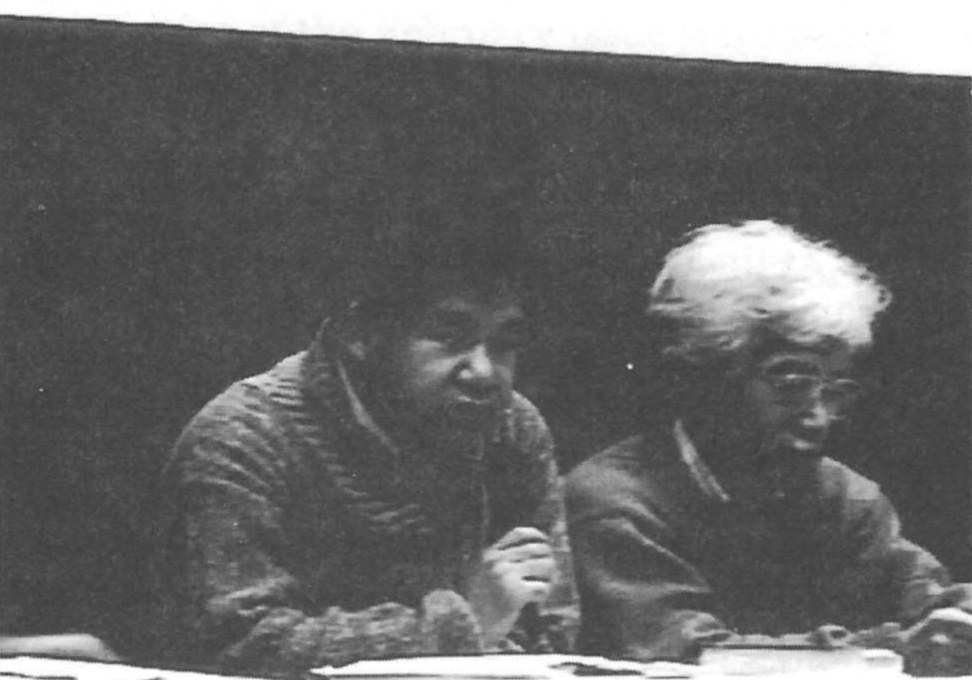
American newspapers and magazines repeatedly assert that the Japanese hold “stereotyped” views about “the Jews,” and frequently disparage them for thinking that Jews wield enormous power around the world, severely punishing anyone who defies their interests. The murder/suicide of Marco Polo magazine is unlikely to disabuse many Japanese of such “stereotyped” views.
As in the United States, Japanese are expected to engage in a kind of Orwellian “doublethink,” simultaneously taking to heart the harsh lesson of Marco Polo‘s demise, while regarding those who forced the execution as feeble victims.
In fact, the Marco Polo incident once again dramatically shows how a well-financed and highly effective international Jewish-Zionist network strives ruthlessly to punish those who threaten its interests.
Many Japanese journalists, editors and intellectuals are privately offended by the arrogant strong-arm methods used by the Zionist-Jewish lobby to suppress free speech and open debate. The Wiesenthal Center campaign ironically may actually increase anti-Jewish sentiment in Japan. Because of fear and intimidation, though, for the time being anyway, this widespread indignation finds little public expression.
In Japan, a long struggle for historical truth and open inquiry about a key chapter of twentieth century world history has begun in dramatic fashion.
Source:https://www.islam-radio.net/islam/english/jewishp/japan/marco_polo_affair.htm

